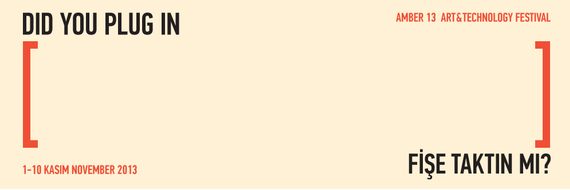DESIGN OR NOT DESIGN: ON OPEN DIGITAL PRODUCTION AND ITS CONTEXTS
Amber’13 Festival Istanbul, Turkey
7-8 November 2014
Moderator: Tincuta Heinzel
The establishment of industrious ways of production was possible due to a series of technical inventions and innovations. The industrialization also leaded to an important change of the way things were consumed, allowing not only a highest production rhythm, but also a highest consumption rate. Along with the massification of the production and the lost of the objects’ aura, the industrialization opened the way to the acquisition of new objects of desire. It also affected the social and professional orders by making place to new social classes and by liberalizing the laws of the guilds. While the traditional ways of doing and learning were replaced by specialized and patented forms of engineering, the aesthetic codes perpetuated by a community were replaced by original authored models and patterns.
Entering the common language in the 1950’s, design referred to the aesthetic issues of the modern world and of industrial production’s contexts. Mediating between basic needs, social status and technical performance, design cover today a brought sense, from the recognized Zeitgeist forms of production (design as an adjective) to innovation process allowing innovation and solving problems (as in the case of the current “design thinking” models). Living in today’s digital age and facing the problems related to worldwide financial and economic crisis, we often turn towards co-creation, participatory design and open design as possible solutions to our economical, social and political problems.
By using theoretical tools the present workshop aims to encourage a critical debate about the status and manifestation of contemporary design in the current digital industry and globalized economy.
The questions to be addressed are :
- In which way the digitalization has an impact on the process of design and production?
- What is the role of the artist/designer in the digital era?
- Can the definitions of consumer and user still be informative in the context of a digital economy?
- In which way the spaces of production and consumption are changing in the digital era?
- Which are the challenges design faces in a digital economy?
The main objectives of the workshop are :
- to put in contact different actors of creative industries and fab labs in the Balkans countries.
- to encourage a critical approach of digital tools.
- to clarify terms like : “made in” or the newest “designed in/designed by”, “sustainable design”, “open design”, “co-design”, “participative design”.
- to draw up new approaches by pointing out to the multidimensional aspects of design processes.
- to propose new policies related to design and creative industries.
WORKSHOP’S AGENDA
7th of NOVEMBER 2013
10:00 – 10:30 : Introduction
10:30 – 12:00 : Overview of the participant’s projects : Fab Lab Kadis Has University, ATOLYE Istanbul – “creative community space”, “Artists in Industry” platform.
12:00 – 14:00 : Lunch
14:00 – 15:00 : Part 1: Spaces of Production. Discussions related to the spaces of production in the digital era : from craftsman’ workshops and factory halls, to fab labs and on-line learning libraries.
15:00 – 16:00 : Part 2: Spaces of Consumption. Discussions related to the spaces of consumption in the digital era : from public markets to on-line shops and from informal public coffee shops to specialized conferences and journals.
8th of NOVEMBER 2013
10:00 – 12:00 : Part 3: Open Design and Digital Production. Discussions about the objects of the digital production : basic needs and desired objects, industrial production, digital craft and digital personalized industrial production, digital world’s new objects (smart phones, wearable technologies, interactive platforms, etc.).
12:00 – 14:00 : Lunch
14:00– 15:00 : Part 4: Open Design and New Economical Models. Discussion about designers’ new role : from conception of objects to conception of processes and from consumption to co-designing. Questions related to the relationship between industrial patents and copyrights and open source approaches will also be addressed.
15:00 – 16:00 : Final Reflection and Writing of a Manifesto. A short recapitulation of issues discussed and synthesis about possible new models of production.
Methods : Using visual illustrations and short texts descriptions, we are going to analyze different models of production organization, from a micro-level to a macro-level. The analysis will result in a series of synthesis tables and the writing of a manifesto.
Note : The participants are encouraged to look for and to present examples related to the different subjects approached. Local related examples will be appreciated. In order to facilitate the presentation, the collected images and short texts should be send by email to : tinca@2580association.info.
